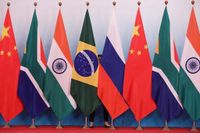In a significant move to bolster agricultural trade amid rising global protectionism, Brazil is leveraging its presidency of the Brics (Brazil, Russia, India, China, and South Africa) in 2025 to foster cooperation among member nations. Minister of Agriculture Carlos Fávaro emphasized the need for enhanced collaboration during the recent Ministerial Meeting of the Brics Agriculture Working Group held at the Itamaraty Palace in Brasília on April 17, 2025.
Fávaro stated that there was a consensus among Brics nations on expanding trade in agricultural products, particularly in light of the new tariffs imposed by the United States. "This unprecedented protectionism from the US government motivates us even more to strengthen this geopolitical bloc and seek new commercial opportunities," he declared, underlining the urgency for the bloc to unite against external economic pressures.
The impact of the US tariffs, often referred to as the "tarifaço," has prompted Brazilian officials to explore alternative markets. The Ministry of Foreign Affairs has warned that these measures will have a "significant impact" on Brazilian exports, compelling the country to diversify its trade relationships globally.
In response to the changing trade landscape, the Brazilian Trade and Investment Promotion Agency (Apex) has identified 1,600 products that Brazil could export to Brics countries, which could help mitigate the adverse effects of the US tariffs. The breakdown of potential exports includes 582 products to South Africa, 400 to China, 388 to India, and 231 to Russia. Key sectors poised for growth include animal protein, processed foods, and ornamental rocks.
Fávaro highlighted the strategic importance of the Brics nations, which collectively account for 30% of the world's agricultural land, 30% of extractive fishing, and 70% of aquaculture production. Together, they represent about half of the global population and house over 550 million family farms, responsible for approximately 80% of the world's food production by value.
During the meeting, member countries signed a series of commitments that form the basis of a new Brics Ministerial Declaration on Agriculture. This declaration reaffirms their commitment to the Global Alliance against Hunger and Poverty, emphasizing the role of family farmers, indigenous peoples, and local communities in food production and sustainable resource management.
One notable initiative discussed was the proposal to establish a Brics Grain Exchange, aimed at facilitating intra-bloc trade based on sustainable practices. This idea, championed by Russian President Vladimir Putin, seeks to protect national markets from external interferences and speculative practices that could lead to artificial food shortages.
Additionally, the Brics countries are focusing on enhancing cooperation in research and development, particularly in agricultural machinery. The joint statement from the meeting underscored the importance of multilateralism for food security and trade practices aligned with the World Trade Organization (WTO).
Looking ahead, a Brazilian delegation from Apex and the Ministry of Foreign Affairs will travel to Europe from April 23 to April 30, 2025, to expedite the ratification of the long-awaited trade agreement between Mercosur and the European Union. This agreement, signed in 2024 after more than two decades of negotiations, is seen as crucial for expanding Brazil's trade horizons.
During their European tour, the delegation will focus on key sectors such as trade, science and technology, and agriculture, with scheduled meetings in Portugal, Poland, and Belgium. Fávaro noted that these discussions aim to strengthen Brazil's position in the global market.
In parallel, President Lula is set to visit China in May 2025 to participate in a meeting of the Community of Latin American and Caribbean States (Celac) with Xi Jinping. This visit is part of Brazil's broader strategy to strengthen ties with Latin American and Caribbean nations and counterbalance US influence in the region.
As the geopolitical landscape continues to evolve, Brazil's commitment to strengthening the Brics bloc presents an opportunity to enhance its agricultural exports and foster greater cooperation among emerging economies. The collective efforts of the Brics nations may prove vital in navigating the complexities of global trade and ensuring food security for their populations.
Fávaro's remarks encapsulate the urgency of the moment: "The future of agriculture is directly linked to our countries' ability to innovate equitably, produce responsibly, and cooperate with trust." As the world grapples with shifting economic paradigms, the Brics bloc stands as a beacon of potential collaboration and resilience.








